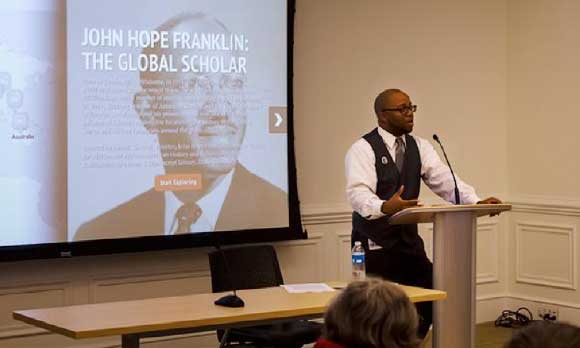
John Gartrell discusses John Hope Franklin's global footprint at a recent Wednesdays at the Center event.
The recent John Hope Franklin Centenary Symposium highlighted the historian’s rich legacy among American scholars. Scholars from around the country convened at Duke to discuss Franklin's influence and continuing inspiration. However, to John Gartrell, Franklin's contributions extend well beyond our nation's borders.
"Franklin's legacy here in the states is unquestioned," said Gartrell, speaking Wednesday at the John Hope Franklin Center. As director of the John Hope Franklin Research Center for African and African American History and Culture, Gartrell oversees the archival materials that Franklin donated to Duke Libraries in 1995.
"He left us with an incredible documentary legacy," Gartrell said. "When we put your life in a box, how many boxes will it take up?"
In advance of the centenary symposium, Gartrell and his team spent a year combing through 300 of these boxes left by Franklin. As the work went on, it underscored the global reach of Franklin's. At Wednesday’s talk, Gartrell mapped the international story of John Hope Franklin and on how his scholarship may have been a form of soldiering.
Map by John Gartrell, John Gartrell, John Hope Franklin Research Center.
In 1951, a young Franklin started his travels by lecturing at the Salzburg Seminar in American Studies. The seminar was an exchange for American scholars to share their country's history and culture with Europe. Franklin went on to visit more than 30 countries in his lifetime, Gartrell said.
At Brooklyn College, Franklin became a leading voice in interpreting American history and current events to international audiences. In 1963, he served as visiting professor at the University of Cambridge. For many English students, going to Franklin's lectures was their first experience seeing an African American as a professor and scholar, Gartrell said.
At the time, international media was focusing attention on the U.S. civil rights movement and the March on Washington. Franklin was able to interpret these events for his audiences at Cambridge, and speak about the African American history and culture that gave rise to what they were seeing in the news.

Franklin's lecture at the Freie Universität Berlin
Franklin was an exhaustive traveller, Gartrell said, crisscrossing the globe to meet with scholars in Africa, Asia, Australia, the Caribbean and Europe. In 1977, Franklin embarked on an African Lecture Series, visiting several universities and archives on the continent. In 1979, he travelled to China to discuss issues of history and historiography. It was one of the earliest visits of an American scholar to communist-era China.
By 1990, he was in Berlin, Germany, to lecture on what Europeans should understand about African American history. Franklin often represented the Foreign Board of Scholars or the U.S. Department of State on these trips.
Franklin noted in many of his papers that it was a pleasure to serve his country. In his youth, he had volunteered for the navy in World War II, but was denied entry because of the color of his skin. Gartrell said that Franklin's global scholarship was, in its own way, a form of military service.
"He was a scholar, he was an activist, and he was a citizen," Gartrell said. "He was on the front lines -- not just of spreading American history and culture globally -- but in almost every lecture, he continually raised the issue of American flaws and how you cannot tell the history of America without African Americans."
Gartrell's talk was the latest in a yearlong series of events celebrating legacy of the John Hope Franklin. For more information, visit https://jhf100.duke.edu.